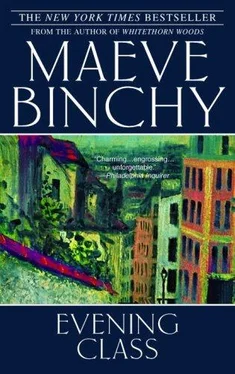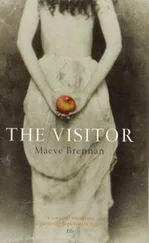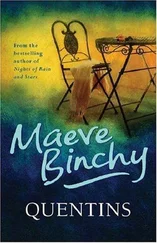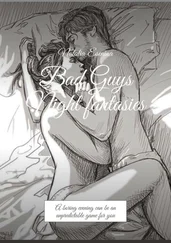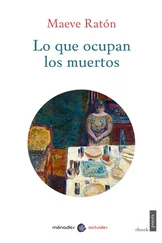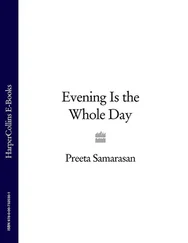Maeve Binchy - Evening Class
Здесь есть возможность читать онлайн «Maeve Binchy - Evening Class» весь текст электронной книги совершенно бесплатно (целиком полную версию без сокращений). В некоторых случаях можно слушать аудио, скачать через торрент в формате fb2 и присутствует краткое содержание. Жанр: Современная проза, на английском языке. Описание произведения, (предисловие) а так же отзывы посетителей доступны на портале библиотеки ЛибКат.
- Название:Evening Class
- Автор:
- Жанр:
- Год:неизвестен
- ISBN:нет данных
- Рейтинг книги:3 / 5. Голосов: 1
-
Избранное:Добавить в избранное
- Отзывы:
-
Ваша оценка:
- 60
- 1
- 2
- 3
- 4
- 5
Evening Class: краткое содержание, описание и аннотация
Предлагаем к чтению аннотацию, описание, краткое содержание или предисловие (зависит от того, что написал сам автор книги «Evening Class»). Если вы не нашли необходимую информацию о книге — напишите в комментариях, мы постараемся отыскать её.
Evening Class — читать онлайн бесплатно полную книгу (весь текст) целиком
Ниже представлен текст книги, разбитый по страницам. Система сохранения места последней прочитанной страницы, позволяет с удобством читать онлайн бесплатно книгу «Evening Class», без необходимости каждый раз заново искать на чём Вы остановились. Поставьте закладку, и сможете в любой момент перейти на страницу, на которой закончили чтение.
Интервал:
Закладка:
Mario and Gabriella ran the local hotel and they did lunches now for visitors and it was very successful. Everyone in Annunziata was pleased because it meant that other people, like wonderful Signora Leone who sold postcards and little pictures of the church and Nora's great friends Paolo and Gianna who made little pottery dishes and jugs with Annunziata written on them, made some money. And people sold oranges and flowers from baskets. And even she, Nora, benefited from the tourists since, as well as making her lace-trimmed handkerchiefs and table runners for sale, she also gave little guided tours for English-speaking visitors. She took them round the church and told of its history, and pointed out the places in the valley where there had been battles and possibly Roman settlements and certainly centuries of adventure.
She never found it necessary to tell Brenda about Mario and Gabriella's children, five of them in all, with big dark eyes looking at her suspiciously with sullen downcast glances from across the piazza . Too young to know who she was and why she was hated and feared, too knowing to think she was just another neighbour and friend.
Brenda and Pillow Case didn't have any children of their own, they wouldn't be interested in these handsome, unsmiling Sicilian children who looked across from the steps of their family hotel at the little room where Signora sat sewing and surveying all that passed by.
That's what they called her in Annunziata, just Signora. She had said she was a widow when she arrived. It was so like her own name Nora anyway, she felt she had been meant to be called that always.
And even had there been anyone who truly loved her and cared about her life, how hard it would have been to try and explain what her life was like in this village. A place she would have scorned if it were back in Ireland, no cinema, no dance hall, no supermarket, the local bus irregular and the journeys when it did arrive positively endless.
But here she loved every stone of the place because it was where Mario lived and worked and sang in his hotel, and eventually raised his sons and daughters, and smiled up at her as she sat sewing in her window. And she would nod at him graciously, not noticing as the years went by. And the passionate years in London that ended in 1969 were long forgotten by everyone except Mario and Signora.
Of course, Mario must have remembered them with love and longing and regret as she did, otherwise why would he have stolen into her bed some nights using the key that she had made for him? Creeping across the dark square when his wife was asleep. She knew never to expect him on a night there was a moon. Too many other eyes might have seen a figure crossing the piazza and known that Mario was wandering from the wife to the foreign woman, the strange foreign woman with the big wild eyes and long red hair. Occasionally Signora asked herself was there any possibility that she could be mad, which was what her family at home thought and was almost certainly the view of the citizens of Annunziata.
Other women would surely have let him go, cried over the loss of his love and got on with their lives. She had only been twenty-four back in 1969, and she lived through her thirties, sewing and smiling and speaking Italian, but never in public to the man she loved. All that time in London when he had begged her to learn his language, telling her how beautiful it was, she had learned hardly a word, telling him that he was the one who must learn English so that they could open a twelve-bedroom hotel in Ireland and make their fortune. And all the time Mario had laughed and told her that she was his redheaded principessa , the loveliest girl in the world.
Signora had some memories that she did not run past herself in the little picture-show of memories which she played in her mind.
She didn't think of the white-hot anger of Mario when she followed him to Annunziata and got off the bus that day, recognising his father's little hotel immediately from the description. His face had hardened in a way that frightened her to think about. He had pointed to a van that was parked outside and motioned her to get in. He had driven very fast, taking corners at a terrible speed, and then turned suddenly off that road into a secluded olive grove where no one could see them. She reached for him, yearning as she had been yearning since she had set out on her journey.
But he pushed her away from him and pointed to the valley down below.
'See those vines, those belong to Gabriella's father, see the ones there, they belong to my father. It has always been known that we will marry. You have no right to come here like this and make things bad for me.'
'I have every right. I love you, you love me.' It had been so simple.
His face was working with the emotion of bewilderment. 'You cannot say that I have not been honest, I told you this, I told your parents. I never pretended that I was not involved with and promised to Gabriella.'
'Not in bed you didn't, you spoke of no Gabriella then,' she had pleaded.
'Nobody speaks of another woman in bed, Nora. Be reasonable, go away, go home, go back to Ireland.'
'I can't go home,' Nora had said simply. 'I have to be where you are. It's just the way things are. I will stay here forever.'
And that was the way it was.
The years passed and by sheer grit Signora became a part of the life of Annunziata. Not really accepted, because nobody knew exactly why she was there and her explanation that she loved Italy was not considered enough. She lived in two rooms in a house on the square. Her rent was low because she kept an eye on the elderly couple who owned the house, brought them steaming cups of caffe latte in the morning and she did their shopping for them.
But she was no trouble. She didn't sleep with the menfolk or drink in the bars. She taught English in the little school every Friday morning. She sewed little fancies and took them every few months to a big town to sell them.
She learned Italian from a little book and it became tattered as she went over and over the phrases, asking herself questions and answering them, her soft Irish voice eventually mastering the Italian sounds.
She sat in her room and watched the wedding of Mario and Gabriella, sewing all the time and letting no tear fall on the linen that she was embroidering. The fact that he looked up at her as the bells rang from the little campanile of the church in the square was enough. He was walking with his brothers and Gabriella's brothers to be married because it was their way. A tradition that involved families marrying each other to keep the land. It had nothing to do with his love for her or hers for him. That couldn't be affected by something like this.
And she watched from this window as his children were carried to the church to be christened. Families needed sons in this part of the world. It didn't hurt her. She knew that if he could have it another way then she would have been his principessa irlandese for all to see.
Signora realised that many of the men in Annunziata knew that there was something between Mario and herself. But it didn't worry them, it made Mario more of a man than ever in their eyes. She always believed that the women knew nothing of their love. She never thought it odd that they didn't invite her to join them when they went to market together, or to gather the grapes that were not used for wine, or to pick the wild flowers for the festival. They were happy when she made beautiful clothes to deck the statue of Our Lady.
They smiled at her over the years as she stumbled through and then mastered their language. They had stopped asking her when she was going home, back to her island. It was as if they had been watching her and she had passed some test. She wasn't upsetting anyone, she could stay.
Читать дальшеИнтервал:
Закладка:
Похожие книги на «Evening Class»
Представляем Вашему вниманию похожие книги на «Evening Class» списком для выбора. Мы отобрали схожую по названию и смыслу литературу в надежде предоставить читателям больше вариантов отыскать новые, интересные, ещё непрочитанные произведения.
Обсуждение, отзывы о книге «Evening Class» и просто собственные мнения читателей. Оставьте ваши комментарии, напишите, что Вы думаете о произведении, его смысле или главных героях. Укажите что конкретно понравилось, а что нет, и почему Вы так считаете.
